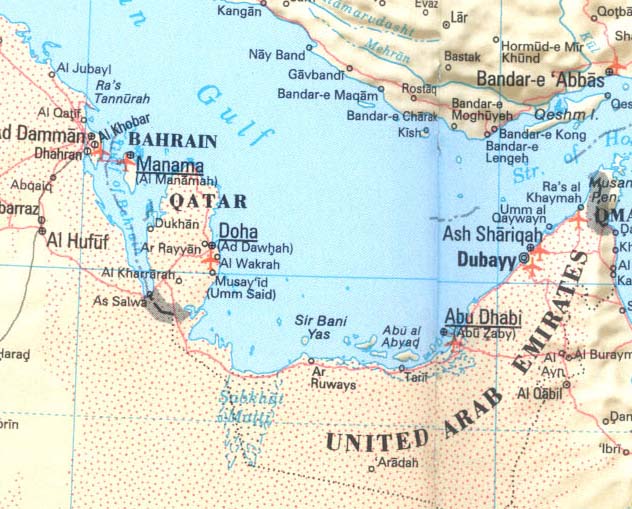

Lunch time conversation recently included our fairly passionate debate over concerns about Qatar treatment of the many ex-pat workers. Not professional level, but the workers who dig the roads, build the buildings and clean the highways. The poor images displayed here were taken from inside my apartment through dirty windows but they do capture a bit of the scene each morning (well before 6:00 am) as busloads of workers are brought from their housing on the ourskirts of Doha. (When I return home in the evening hundreds are lined up, waiting to board buses.)
Friday (the first day of our week-end) is more and more becoming a declared family day in the malls – the only place to hang out – and this means no single men. I can get in; a single (or unaccompanied) man can get in by speaking what appears to be flawless English. The aim is to keep the thousands of Indian, Pakistani etc who work Saturday-Thursday out of the malls where they stand and stare. Are they doing so, we ask, because they are deprived of the female sex (the belief it appears of the Qatari) or because (my partial explanation) they are bored and men do stare at women? In any event, we now have these new rules and some of us chaff at them as SO discriminatory.
Our conversation also included the plans to build special ‘parks’ for these laborers thereby further segregating them but giving them some space of their own. Colleagues of mine, Asian in origin, have been treated as if they are day laborers and the discrimination here bothers this community of academics. A fellow institution took a group of mostly local students to see the workers’ housing and they were appalled. More spreading of information and knowledge of the true conditions will help. Which leads to my topic here:
This week’s papers announce the beginning of the academic year in various articles. There is a piece on the inaugural class of students in two programs at Northwestern University’s Education City campus (journalism and communication programs). And so it seems, as I read local news, just in time. The inauguration of a program in journalism offers the possibility that students may be introduced to investigative journalism, exploring further the study of the Qatari treatment of imported locals working at jobs the Qatari don’t want (construction, retail sales etc) and living in conditions they can’t imagine. There is also hope (on my part at least) that the reporting in the local news will reach a level above street language, as a story in the same paper shows and from which I quote here(bold highlights mine). From The Peninsula, August 18, 2008:
"Two conmen who had been posing as police officers and intimidating people into giving them money have been convicted on two separate charges. Both are youngsters barely out of school.
In the first instance, the two, who were in a car, stopped a pedestrian and told him to get in their vehicle saying they needed to verify his identity. The pedestrian was carrying a laptop, a camera and an expensive mobile phone. The duo then asked him to prove that the valuables belonged to him.
They kept his identity card, ATM and credit cards along with the valuables. The ‘policemen’ then asked to see his passport. As he was not carrying it, he took them to his house. Once they reached there, he entered his home only to find they had pulled a vanishing act. He also discovered that they had used his ATM card to withdraw QR11,000.
In the second case, the swindlers stopped a man near his house late in the night. He was asked to produce his ID and wallet for a routine check. This victim, too, was asked to show his passport. Again, the two disappeared as soon as the man entered his home. He found out later the conmen had used his ATM card to purchase a number of items from six different shops.
However, the culprits soon ran out of luck. The victim one day happened to see the pair in another part of the town in their car.
This time, he noted the car's registration number and tipped off the real police along with a vivid description of the two. The police soon arrested the con artists.
So upset was the doting mother of one of the criminals to learn about his involvement in the heinous crimes, she lost her eyesight.
The Lower Court sentenced the two to six years’ imprisonment. However, the sentence was later reduced to one year on account of their young age. "
Maybe I have spent too long reading the New York Times ...







